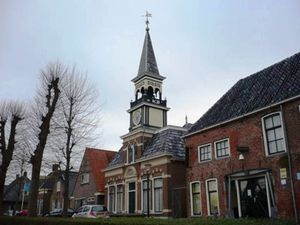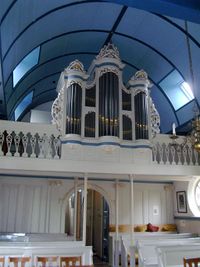Difference between revisions of "Oudebildtzijl (Friesland, Netherlands)"
| [checked revision] | [checked revision] |
(Forced table of contents to top of page; added categories; and added images.) |
m (Added bibliographical item.) |
||
| Line 7: | Line 7: | ||
Oudebildtzijl, a village in the Dutch province of [[Friesland (Netherlands)|Friesland]], about ten miles (16 km) northwest of [[Leeuwarden (Friesland, Netherlands)|Leeuwarden]]. In 1505 a large piece of land was reclaimed from the sea by dykes and was known as the Bildtland, which was drained into the ocean by means of a sluice (<em>zijl</em>), near which the village Oudebildtzijl later arose. Many of the peasants who settled in this Bildt-polder are thought to have organized very soon into a Mennonite congregation, the center of which was probably in [[Annaparochie, Sint (Friesland, Netherlands)|Sint Anna-Parochie]] (at that time usually called Annakerk). The Mennonites living in and near Oudebildtzijl belonged to this congregation. A list set up on the occasion of the organization of the Mennonite Conference of Friesland (<em>Friesche Doopsgezinde Sociëteit</em>) in 1695 does not name Oudebildtzijl, which indicates that the members were still part of the Annakerk congregation; this is also the case in 1735, but at that date this congregation is called St-Annakerk and Bildtzijl. [[Cate, Steven Blaupot ten (1807-1884)|Blaupot ten Cate]] (<em>Friesland</em>: 192) writes that in 1695 the St-Annakerk and Oudebildtzijl congregations had already merged and had a total of 118 members, but it is more likely that they had not yet been separated. | Oudebildtzijl, a village in the Dutch province of [[Friesland (Netherlands)|Friesland]], about ten miles (16 km) northwest of [[Leeuwarden (Friesland, Netherlands)|Leeuwarden]]. In 1505 a large piece of land was reclaimed from the sea by dykes and was known as the Bildtland, which was drained into the ocean by means of a sluice (<em>zijl</em>), near which the village Oudebildtzijl later arose. Many of the peasants who settled in this Bildt-polder are thought to have organized very soon into a Mennonite congregation, the center of which was probably in [[Annaparochie, Sint (Friesland, Netherlands)|Sint Anna-Parochie]] (at that time usually called Annakerk). The Mennonites living in and near Oudebildtzijl belonged to this congregation. A list set up on the occasion of the organization of the Mennonite Conference of Friesland (<em>Friesche Doopsgezinde Sociëteit</em>) in 1695 does not name Oudebildtzijl, which indicates that the members were still part of the Annakerk congregation; this is also the case in 1735, but at that date this congregation is called St-Annakerk and Bildtzijl. [[Cate, Steven Blaupot ten (1807-1884)|Blaupot ten Cate]] (<em>Friesland</em>: 192) writes that in 1695 the St-Annakerk and Oudebildtzijl congregations had already merged and had a total of 118 members, but it is more likely that they had not yet been separated. | ||
| − | The congregation had two meetinghouses, one in St-Anna-Parochie and one in Oudebildtzijl. The Oudebildtzijl meetinghouse dated from 1636 or even before. [[Church Records|Church records]] have been preserved since 1642. By 1806 the St-Annakerk congregation had completely disintegrated and the church had been dismantled. In the same year Oudebildtzijl built a new church and became an independent congregation, then numbering 9 baptized members (34 in 1838). | + | The congregation had two meetinghouses, one in St-Anna-Parochie and one in Oudebildtzijl. The Oudebildtzijl meetinghouse dated from 1636 or even before. [[Church Records|Church records]] have been preserved since 1642. By 1806 the St-Annakerk congregation had completely disintegrated and the church had been dismantled. In the same year Oudebildtzijl built a new church at Dominee Schuilingstraat 6 and became an independent congregation, then numbering 9 baptized members (34 in 1838). The church building was enlarged in 1860 and again in 1908, and a parsonage was bought, which was renovated in 1891. An organ was installed in 1896. The Oudebildtzijl church is the only Mennonite church in the [[Netherlands|Netherlands]] that has a bell in its tower, which serves as the village clock. When the bell was rung on the occasion of the birth of Princess Juliana on 30 April 1909, it cracked; for its repair a contribution was made by Queen Wilhelmina. The new bell was taken by the Germans in 1944. The congregation, which in the 1950s still consisted largely of farmers, numbered 140 baptized members in 1957 (88 in 1861, 98 in 1900). |
| − | + | In 1812 the congregation called Roelof Schuiling to the ministry; he served until 1817, then moving to [[Hindeloopen (Friesland, Netherlands)|Hindeloopen]]. In 1818 Schuiling was called in a second time, the congregation of Oudebildtzijl now having united with the neighboring congregation of [[Hallum (Friesland, Netherlands)|Hallum]]. Schuiling, who lived at Oudebildtzijl, served until 1857. When he left, each congregation decided to call a pastor, and on 12 September 1858, Lamorael Noteboom, who had been the minister in [[Ternaard (Friesland, Netherlands)|Ternaard]], became the first pastor of Oudebildtzijl itself. Pastor Noteboom served here until 1883. He was followed by [[Frerichs, Geert Elias (1836-1906)|G. E. Frerichs]] 1884-1890, J. Kooiman 1891-1893, A. Hermansz ten Cate 1893-1899, B. H. Rudolphi 1900-1906, R. Kuipers 1906-1914, M. A. Hylkema 1915-1922, J. Yntema 1922-1926, L. D. G. Knipscheer 1926-1931, Miss J. M. Eelman 1932-1942, H. Bremer 1942-1946, D. Attema, a retired minister of Zaandam, 1946-1949, B. K. Homan 1950-1954, and M. J. Heynes 1955- . The congregation had a Sunday school for children, a youth group, and a ladies' circle. | |
| − | + | In 1997 the church was closed and it became a visitor center for cultural and natural history. | |
= Bibliography = | = Bibliography = | ||
Cate, Steven Blaupot ten. <em class="gameo_bibliography">Geschiedenis der Doopsgezinden in Friesland</em>. Leeuwarden: W. Eekhoff, 1839: <em class="gameo_bibliography">passim</em>., see Index. | Cate, Steven Blaupot ten. <em class="gameo_bibliography">Geschiedenis der Doopsgezinden in Friesland</em>. Leeuwarden: W. Eekhoff, 1839: <em class="gameo_bibliography">passim</em>., see Index. | ||
| Line 20: | Line 20: | ||
<em class="gameo_bibliography">Naamlijst der tegenwoordig in dienst zijnde predikanten der Mennoniten in de vereenigde Nederlanden</em>. Amsterdam, (1829): 44 f. | <em class="gameo_bibliography">Naamlijst der tegenwoordig in dienst zijnde predikanten der Mennoniten in de vereenigde Nederlanden</em>. Amsterdam, (1829): 44 f. | ||
| + | |||
| + | Reliwiki. "Oudebildtzijl, Dominee Schuilingstraat 6 - Julianakerk." 25 May 2014. Web. 12 October 2014. http://reliwiki.nl/index.php/Oudebildtzijl,_Dominee_Schuilingstraat_6_-_Julianakerk. | ||
{{GAMEO_footer|hp=Vol. 4, pp. 97-98|date=1959|a1_last=Zijpp|a1_first=Nanne van der|a2_last= |a2_first= }} | {{GAMEO_footer|hp=Vol. 4, pp. 97-98|date=1959|a1_last=Zijpp|a1_first=Nanne van der|a2_last= |a2_first= }} | ||
[[Category:Places]] | [[Category:Places]] | ||
Revision as of 23:04, 12 October 2014
Oudebildtzijl, a village in the Dutch province of Friesland, about ten miles (16 km) northwest of Leeuwarden. In 1505 a large piece of land was reclaimed from the sea by dykes and was known as the Bildtland, which was drained into the ocean by means of a sluice (zijl), near which the village Oudebildtzijl later arose. Many of the peasants who settled in this Bildt-polder are thought to have organized very soon into a Mennonite congregation, the center of which was probably in Sint Anna-Parochie (at that time usually called Annakerk). The Mennonites living in and near Oudebildtzijl belonged to this congregation. A list set up on the occasion of the organization of the Mennonite Conference of Friesland (Friesche Doopsgezinde Sociëteit) in 1695 does not name Oudebildtzijl, which indicates that the members were still part of the Annakerk congregation; this is also the case in 1735, but at that date this congregation is called St-Annakerk and Bildtzijl. Blaupot ten Cate (Friesland: 192) writes that in 1695 the St-Annakerk and Oudebildtzijl congregations had already merged and had a total of 118 members, but it is more likely that they had not yet been separated.
The congregation had two meetinghouses, one in St-Anna-Parochie and one in Oudebildtzijl. The Oudebildtzijl meetinghouse dated from 1636 or even before. Church records have been preserved since 1642. By 1806 the St-Annakerk congregation had completely disintegrated and the church had been dismantled. In the same year Oudebildtzijl built a new church at Dominee Schuilingstraat 6 and became an independent congregation, then numbering 9 baptized members (34 in 1838). The church building was enlarged in 1860 and again in 1908, and a parsonage was bought, which was renovated in 1891. An organ was installed in 1896. The Oudebildtzijl church is the only Mennonite church in the Netherlands that has a bell in its tower, which serves as the village clock. When the bell was rung on the occasion of the birth of Princess Juliana on 30 April 1909, it cracked; for its repair a contribution was made by Queen Wilhelmina. The new bell was taken by the Germans in 1944. The congregation, which in the 1950s still consisted largely of farmers, numbered 140 baptized members in 1957 (88 in 1861, 98 in 1900).
In 1812 the congregation called Roelof Schuiling to the ministry; he served until 1817, then moving to Hindeloopen. In 1818 Schuiling was called in a second time, the congregation of Oudebildtzijl now having united with the neighboring congregation of Hallum. Schuiling, who lived at Oudebildtzijl, served until 1857. When he left, each congregation decided to call a pastor, and on 12 September 1858, Lamorael Noteboom, who had been the minister in Ternaard, became the first pastor of Oudebildtzijl itself. Pastor Noteboom served here until 1883. He was followed by G. E. Frerichs 1884-1890, J. Kooiman 1891-1893, A. Hermansz ten Cate 1893-1899, B. H. Rudolphi 1900-1906, R. Kuipers 1906-1914, M. A. Hylkema 1915-1922, J. Yntema 1922-1926, L. D. G. Knipscheer 1926-1931, Miss J. M. Eelman 1932-1942, H. Bremer 1942-1946, D. Attema, a retired minister of Zaandam, 1946-1949, B. K. Homan 1950-1954, and M. J. Heynes 1955- . The congregation had a Sunday school for children, a youth group, and a ladies' circle.
In 1997 the church was closed and it became a visitor center for cultural and natural history.
Bibliography
Cate, Steven Blaupot ten. Geschiedenis der Doopsgezinden in Friesland. Leeuwarden: W. Eekhoff, 1839: passim., see Index.
Doopsgezinde Bijdragen (1861): 139; (1907): 210; (1909): 191; (1910): 131 f.
Hege, Christian and Christian Neff. Mennonitisches Lexikon, 4 vols. Frankfurt & Weierhof: Hege; Karlsruhe: Schneider, 1913-1967: v. III, 329 f.
Naamlijst der tegenwoordig in dienst zijnde predikanten der Mennoniten in de vereenigde Nederlanden. Amsterdam, (1829): 44 f.
Reliwiki. "Oudebildtzijl, Dominee Schuilingstraat 6 - Julianakerk." 25 May 2014. Web. 12 October 2014. http://reliwiki.nl/index.php/Oudebildtzijl,_Dominee_Schuilingstraat_6_-_Julianakerk.
| Author(s) | Nanne van der Zijpp |
|---|---|
| Date Published | 1959 |
Cite This Article
MLA style
Zijpp, Nanne van der. "Oudebildtzijl (Friesland, Netherlands)." Global Anabaptist Mennonite Encyclopedia Online. 1959. Web. 3 Feb 2026. https://gameo.org/index.php?title=Oudebildtzijl_(Friesland,_Netherlands)&oldid=126125.
APA style
Zijpp, Nanne van der. (1959). Oudebildtzijl (Friesland, Netherlands). Global Anabaptist Mennonite Encyclopedia Online. Retrieved 3 February 2026, from https://gameo.org/index.php?title=Oudebildtzijl_(Friesland,_Netherlands)&oldid=126125.
Adapted by permission of Herald Press, Harrisonburg, Virginia, from Mennonite Encyclopedia, Vol. 4, pp. 97-98. All rights reserved.
©1996-2026 by the Global Anabaptist Mennonite Encyclopedia Online. All rights reserved.


